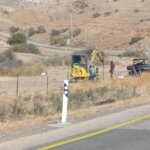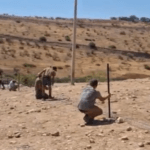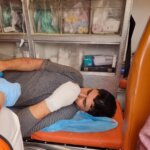Israel arms settlers with assault rifles, as attacks on local Palestinians escalate and the Jordan Valley is locked down
THE SITUATION IN THE JORDAN VALLEY SINCE THE ESCALATION OF THE ISRAELI-PALESTINIAN CONFLICT
In light of recent developments in the Israeli-Palestinian conflict, the plight of Palestinians in the Jordan Valley has worsened significantly. According to an article published on Israel National News’ website on the 12th of October 2023, Yossi Dagan, the Chairman of the Settlements Council in the northern occupied West Bank, sanctioned an arm deal to procure a minimum of 200 assault rifles, aimed at bolstering reserve units within the settlements. This move poses a real and imminent danger to Palestinians, especially after the cessation of active hostilities. Over the past six years, there has been a noticeable escalation in settler aggression against the civilian population in the West Bank, particularly in areas classified as C.
In a disconcerting escalation, the Israeli government has granted authorization for the distribution of firearms to all settlers. Simultaneously, the Israeli Knesset declared a state of emergency, granting a troubling carte blanche for the elimination of suspected individuals without warning or fear of legal repercussions. On the ground, this has translated into forced displacements, continuous assaults, and rampant theft perpetrated against the Palestinian population.
Amidst this climate of uncertainty and aggression, the struggle for survival persists within various Palestinian communities, set against a backdrop of displacement, water scarcity, and economic hardships exacerbated by the ongoing hostilities. The occupation forces have further tightened their grip, deporting Palestinian workers from Gaza to various cities in the West Bank, leaving them homeless and economically stranded.
As tensions continue to mount and diplomatic efforts reach a critical juncture, the region teeters on the edge of a precipice. The international community remains closely engaged, attentively monitoring developments, and fervently hoping for a peaceful resolution to this perilous and volatile situation.
The events of recent days highlight the escalating crisis:
- Tariq Kaabneh’s family experienced forced displacement from Khirbet Samra in the northern Jordan Valley after enduring severe beatings by settlers. Subsequently, the Israeli police arrested Tariq and attempted to steal his sheep and car before deporting him to the Maleh area.
- In Al-Malihat, located east of Ramon, six families were forcibly displaced under the menacing threat of settlers’ weapons. These families hailed from Ain Al-Zaraa near Al-Hamra in the Jordan Valley.
- The Abu Al-Kabash family faced displacement from the Hamra area following a violent attack by settlers.
- A disconcerting attempt was made to displace the Persian family of Abu Khairy. Thankfully, thanks to the solidarity of locals, he managed to return to his home near the Rotem settlement in the northern Jordan Valley.
- In Wadi Al-Siq, 30 Palestinian families were subjected to forced displacement at gunpoint, enduring the theft of their vehicles and money, and were prevented from taking their belongings.
- The body of Zuhdi Ziad Al-Maghribi from Jericho was found last Friday after he was kidnapped by settlers two days before.
- Palestinian workers from Gaza who were employed in Israel have faced mass deportations to various cities in the West Bank, with 620 of them currently stranded in the northern and southern Jordan Valley without a home or work. Their movement between Palestinian cities has been severely restricted due to barriers imposed by both the occupation and settlers.
- The occupation army’s checkpoints have created a hostile environment, preventing the free movement of citizens into the Jordan Valley. Only residents of the Jordan Valley are allowed passage, subject to searches and potential arrests based on their identity card details.
The communities are acutely aware of the challenging stage they face, grappling with survival amidst an ongoing war against the Bedouins and herding groups. The state of emergency and the relentless crimes against children and civilians in Gaza have been exploited. Despite the adversity, community solidarity remains resilient, as evidenced by four recent gatherings that brought water from Bardala and Ain al-Bayda.





